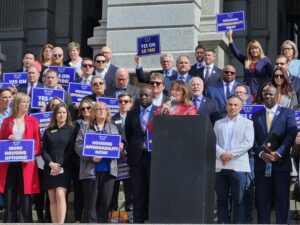At the start of the 2024 legislative session, Colorado business leaders cringed at the thought of frustrated progressives not just bringing back bills that were killed by moderates in 2023 but pushing for even greater regulation.
Yet, as Capitol custodians begin cleaning out the debris of the 120-day session that wrapped Wednesday, sector leaders are taking a moment to reorient their thinking significantly. In fact, this session may go down not only as one where they once again beat back multiple bills that would have made it more difficult to operate in this state but actually passed several proposals that will improve Colorado’s competitive landscape.
Put simply, this session wasn’t just a repeat of 2023 in which business leaders can feel relief at the bills they were able to defeat. It actually was a year in which business made notable gains — arguably the best session in that sense since the last years of split-party rule in 2017 and 2018.
Here’s why.
Not just defeats, but deals
When business leaders worked with moderate Democrats or Republicans to scale back or kill their most opposed bills during the 2023 session, they were under no illusion that their victories represented anything more than temporary wins. Sure enough, sponsors brought back killed or vetoed bills — including a right-of-first-refusal proposal on apartment sales and a study on implementing a single-payer health-care system — and supplanted a water-down air-quality regulation bill with three measures that would have gone much further.
But late this session, through an extended series of negotiations, industry leaders didn’t just dispatch the worst bills and ballot measures that they faced. They got promises that the most opposed legislation would not be rising from the grave in new forms, at least for several years.

Sen. Kevin Van Winkle questions Colorado Oil & Gas Association President/CEO Dan Haley during a Senate Finance Committee hearing on May 2.
On April 29, for example, Gov. Jared Polis announced a deal with oil-and-gas industry leaders and environmentalists that killed three of the industry’s four most hated proposed regulatory ramp-ups in one fell swoop. (The fourth, a ban on new drilling, already had died.) The price? Removal of several industry-backed ballot initiatives seeking regulatory rollbacks, acceptance of a new fee on oil and gas production and passage of new rules offered in a last-minute bill that were far less onerous than those proposed in the three killed bills.
Six days later, Polis announced another deal with business leaders and opponents — this time, trial lawyers — that pulled down a pair of ballot initiatives to remove lawsuit damage caps that could have done $2 billion in damage to the state’s economy. The Colorado Trial Lawyers Association got significant concessions in the agreement, including a tripling of caps on several types of claims, but businesses got certainty out of the deal and the knowledge they won’t have to fight that battle again anytime soon.
“On oil and gas, we’re better off for two years. On medical malpractice and other claims, this will have long-term benefits like mitigating the likelihood of further initiatives,” said Loren Furman, president/CEO of the Colorado Chamber of Commerce. “We didn’t sit on the sidelines.”
Proactive wins
Then there were the issues on which business leaders found common ground with Polis and pressed ahead offensively.
When voters reject his proposed trade of property-tax rate breaks for Taxpayer’s Bill of Rights caps at the ballot in 2023, Polis pushed legislators in a hastily called special session last year to form a commission that could offer long-term property-tax solutions. After meeting for months, commission leaders pushed through a $1.3 billion tax break for residential and commercial properties (after the latter were sometimes overlooked in past deals) and passed it with huge bipartisan support in the final three days of the session.

Gov. Jared Polis unveils a bipartisan workforce-development package in his chambers at the Capitol on Thursday.
Business leaders who have been suffering from significant talent shortages since before the pandemic also got proactive in trying to solve that problem last year, forming the Education to Employment Alliance and offering recommendations on how to align the skills of local graduates with those needed by growing industries. Five bills in the 2024 session included parts of those recommendations, including a priority push to develop employer-led regional talent-development plans throughout the state, and all five of those bills passed, usually with bipartisan backing.
Even in the controversial area of oil-and-gas regulations, energy companies believed they could move forward on getting the state to permit carbon-capture projects, an evolving technology that both removes emissions from the atmosphere and gives them a new line of business during a period of transition. While environmental groups added onto the bill a definition of “cumulative impacts” that will affect all energy and carbon-management projects, the success of House Bill 1346 still paves the way for job creation in the sector.
Addressing costs of living and doing business
In addition to a mismatch of skills, employers cite the lack of affordable housing as a major reason for talent shortages, saying workers can’t afford to live near their jobs. One year after Polis’ omnibus land-use-reform practice died in a high-profile fight with municipal-government leaders, the Democratic governor and legislative allies made enough concessions on a bill package to push it across the finish line.
The soon-to-be laws require cities to boost housing density around transit lines, permit homeowners to build accessory dwelling units, loosen local minimum-parking regulations and bar cities from enforcing limits on the number of unrelated people living together. They come with new transit-oriented-community tax credits, a tripling of existing affordable housing tax credits and few major sticks, after legislators removed a provision from one bill that would strip transportation funding from cities not following new density requirements.

Colorado state Rep. Iman Jodeh, sponsor of the bill to increase transit-oriented communities, speaks at a news conference as a train moves behind her.
Legislators also passed a bill to boost funding for childcare development that would offer technical assistance to people developing facilities, help local governments incorporate childcare in planning and give grants for constructing early childhood education centers. Bill backers argued that the lack of statewide childcare facilities is stopping too many parents from returning to the workforce.
Despite growing consternation among Republicans over tax credits that reduce Taxpayer’s Bill of Rights surplus refunds, legislators also OK’d a bill creating $74 million in tax credits for the quantum sector as the state tries to win federal designation as a national industry hub. Another bill temporarily reduces the income-tax rate from 4.4% to 4.25% and creates new mechanisms for refunding TABOR overages based on income and sales taxes.
Regulatory wins and losses
Not everything, of course, went business leaders’ way. That was particularly true in the realm of labor relations, where legislators passed several bills opposed by industry leaders, Republicans or both.
House Bill 1008, which is likely to draw calls for a veto, would allow construction workers stiffed by subcontractors to go directly to contractors and demand payment — a solution that advocates described as justice but that builders called costly and unfairly targeted. HB 1260, meanwhile, bars employers from retaliating against workers who refuse to sit through meetings with political or religious content — a bill that supporters say is meant to ban union-busting captive-audience meetings but that opponents say is so broad that it could allow workers to avoid discussions critical to their jobs.
One year after failing to pass nation-leading regulations on transportation- and delivery-network companies like Uber and DoorDash who rely on gig-worker drivers, labor advocates brought back two bills to address the two parts of the sector separately in 2024. Company leaders worked for months to get the proposals to the point where they are acceptable to them, but the measures still will impose new limits on how companies oversee drivers and require a lot of reporting of information to the state.

NAIOP Colorado Executive Director Kathie Barstnar speaks at a rally at the Capitol in March for construction-defects reform.
Local-government leaders, working against business groups, were able to pass a modified bill that will give cities and counties rights of first refusal on some apartment complexes going up for sale and a lesser but still transaction-slowing right of first offer on others. But those same local leaders, working this time with businesses, failed to convince legislators to advance construction-defects reform that is viewed as necessary to restarting the largely non-existent condominium-building market offering entry-level-priced homes.
However, businesses also successfully beat back several regulations and cost-hiking bills in ways that may make it more difficult for legislators to bring them forward again.
For the second year in a row, for example, a Senate committee killed an effort to make it easier to file Colorado Consumer Protection Act claims allowing for attorney’s fees and treble damages that make them more attractive cases for lawyers to take. Also, for a second year in a row, the Senate squelched a bill to study implementation of a single-payer health-care system that could eliminate the local health-insurance industry and costs tens of billions of dollars for the state to launch.
And while legislators killed a bill for just the first time to require short-term rental owners to pay commercial-level property tax rates — a quadrupling of costs that left mountain-town business leaders fearful of a sharp decline in local lodging options — they made a statement in doing so. Senate Bill 33 failed to get support from anyone on the committee that heard it other than the bill sponsor, and the reverberations led the sponsor of a separate but more moderate increase in regulations on those propertis to kill her own bill without a hearing.
Positive reactions

Colorado Senate President Steve Fenberg speaks at a May 6 news conference announcing a property-tax relief bill.
Legislators from both parties spent the hours immediately following the session’s adjournment extolling what came from it. Polis boasted of the affordable-housing gains and tax breaks, Democratic Senate President Steve Fenberg labeled housing and educational accomplishments as “nothing short of transformational” and even Senate Republicans praised bipartisan efforts like the property-tax bill.
Furman said business leaders were able not just to defend employers successfully but achieve many longer-term goals in ways they haven’t in a long time.
“I think that our approach of being more proactive and ensuring we defeated the bad bills while also making our state more competitive made this the most successful session in years,” she said.
